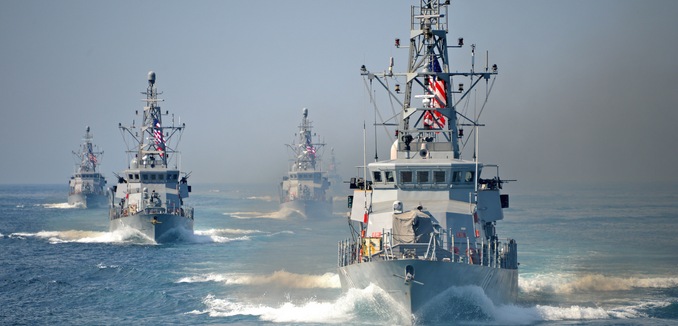Seven armed boats from the navy of Iran’s Islamic Revolutionary Guards Corps (IRGC) swarmed a U.S. Navy patrol ship in the Persian Gulf on Sunday, forcing it to change course after the Iranians came within 100 yards and stopped their vehicles in the American ship’s path, officials from the U.S. Defense Department said on Tuesday.
The incident was “unsafe and unprofessional due to lack of communications and the close-range harassing maneuvering,” a U.S. Defense official told Reuters on condition of anonymity. The official added that manned weapons were visible inside the Iranian boats.
This was at least the fourth such incident in the past month, prompting American concern about the possibility of a more dangerous encounter in the future. “The big concern here is miscalculation,” U.S. Central Command chief Gen. Joseph Votel said last week, adding, “If they continue to test us, we are going to respond, and we are going to protect ourselves and our partners.”
There have been 31 other such incidents this year, about double the amount as of this time last year, a Defense Department official told Reuters. “We don’t see this type of unsafe and unprofessional activity from any other nation,” he added.
Sailors aboard the USS Nitze recorded an encounter last month when Iranian boats came as close as 300 yards, forcing it and the USS Mason to change course to avoid a collision. Two weeks later, two U.S. patrol coastal ships, the USS Tempest and the USS Squall, were operating in international waters in the northern Gulf when IRGC boats approached them at high speed and passed within 600 yards of Tempest three times. The Iranians ignored radio warnings that their actions were dangerous.
U.S. Navy 5th Fleet spokesman Cmdr. Bill Urban said at the time that Central Command had “assessed all of these interactions as unsafe and unprofessional due to the Iranian vessels not abiding by international law and maritime standards, including the 1972 Convention on the International Regulations for Preventing Collisions at Sea (COLREGS) maritime ‘Rules of the Road.’”
These incidents are the latest Iranian challenges to the American presence in the Persian Gulf and its commitment to keep the area open to international shipping.
Ten American sailors and their two boats were seized by IRGC naval forces in January of this year, in violation of international law.
Subsequent to the sailors’ release, Iran portrayed their capture as a victory against the U.S., releasing the sailors after claiming that Washington had apologized for the incident. Iranian Supreme Leader Ayatollah Ali Khamenei proclaimed that the naval forces who captured the sailors did “God’s deed” and issued medals to the commanders involved, while the IRGC announced plans to build a statue to commemorate the seizure.
In May, the deputy commander of the IRGC threatened to close the strategic Straits of Hormuz to the U.S. and its allies if they “threaten us,” adding: “Americans cannot make safe any part of the world.”
The U.S. Navy reported last month that in 2015, there were close to 300 encounters or “interactions” between American and Iranian naval vessels in the Persian Gulf. While most of the encounters were not considered to be harassment, the behavior of the Iranian navy was found to be less disciplined than that of other navies. Lt. Forrest Griggs, the operations officer of the USS New Orleans, explained that risks arise from the unpredictable behavior and uncertain intent of the Iranian vessels. “It’s very common for them to come up to within 300, 500 yards of us, and then they’ll turn, or parallel us and stop,” he told Fox News.
Vice Adm. Kevin Donegan, the commander of the Navy’s 5th Fleet, observed in November that Iran’s “malign behavior” at sea had not changed since the announcement of the nuclear deal four months earlier.
[Photo: U.S. Naval Forces Central Command / Flickr ]




